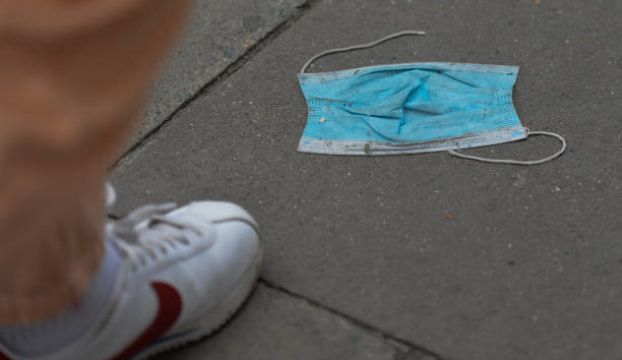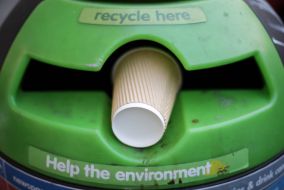Close to 33 per cent of Irish towns and cities have Personal Protective Equipment (PPE) litter such as masks, according to the business group Irish Business Against Litter (IBAL).
Their latest survey which looked at over 100 Irish towns and cities, found that the issue of PPE litter is growing across the country.
Speaking to BreakingNews Conor Horgan from IBAL said: "Cleanliness in our communities is underpinned by people acting in a civic manner. I imagine generally people are more reluctant to pick up other people's litter nowadays because of Covid.
"There is a danger that we might not get back into the habit of picking up litter and that will certainly have a detrimental impact on cleanliness."
This also means that cleaners have to pick up other people's used masks which increases their risk of contracting the virus.
Horgan said: "Masks are now up there with other forms of prevalent litter such as cigarettes, crisps wrappers and take away bags."
Their survey found a significant rise in other pandemic-related litter, such as coffee cups, while alcohol-related litter remained at previous levels despite hospitality reopening and the survey being conducted in winter.
One the more positive aspect of the survey is that the likes of Naas, Leixlip and Portlaoise are cleaner than European norms.
Community spirit
As Horgan suggests there seems to be more of a community spirit in rural areas where people take pride in keeping their locale clean.
Unfortunately, urban areas are the places that have most of the issues with litter. Areas that are considered heavily littered according to the survey include: Cork Northside, Dublin City Centre and Drogheda.
Dublin's North Inner City meanwhile was labelled as a litter blackspot.
"That is one of the more disheartening things from the survey is levels of litter in our cities. It seems to be one month littler is up and the next it is down, so there is no consistency," he said.
The view in cities is that it is local authorities job to pick up litter, so it isn't looked down upon the same way it is in rural areas.
Derelict shops and stores in city centres are also hotspots for litter. According to litter laws in Ireland business owners are responsible for keeping the area around their premises clean.
When it comes to abandoned stores it can often be more of a hassle to try and contact the landlord again it is often left up to local authorities to deal with it.
Inner city streets
Another issue which contributes to litter specifically in Dublin is that hundreds of inner city streets were given exemptions for bin collections under EU law.
Certain streets that are too small for bin collection trucks to go down were given this special exemption. As Horgan said it often leads to bins overflowing in Dublin city centre which attracts seagulls and creates a bigger mess.
What it all comes down to really is having enough funding to clean the streets and as he said compared to other issues such as drug addiction or anti-social behaviour, it can be fixed.
"Dublin City Council could go out tomorrow morning to Sheriff Street and have it absolutely spotless, but it would cost a fortune to keep it that way.
"However, out of all the social ills we face, it is one that can be fixed more easily than most," he said.







